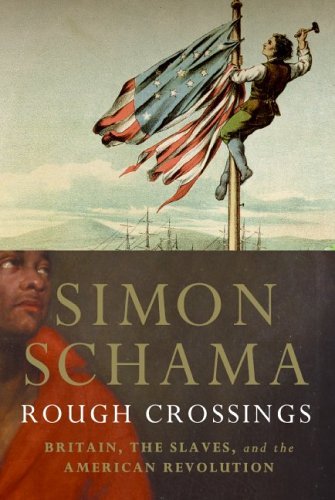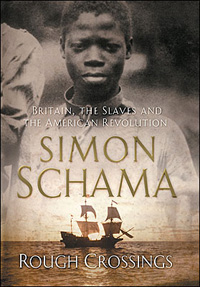
As reviewed in the New York Times, by Brent Staples, on 4 June 2006, "'Rough Crossings: Britain, the Slaves and the American Revolution,' by Simon Schama," in an article entitled, "Give Us Liberty" -- Imagine how history would have unfolded had we lost the Revolutionary War and been brought to heel by His Britannic Majesty, King George III. Instead of being revered as founders, George Washington, Thomas Jefferson and their compatriots could well have been marched to the gallows and forgotten. British propagandists would have churned out a mythology much like the one American schoolchildren are force-fed today — but with the national roles reversed. The British monarchy would be depicted as the champion of liberty, with the rebels cast as agents of republican chaos and tyranny. The lesson would no doubt focus on the contradiction cited by Samuel Johnson, who inquired pithily of the Americans in 1775: "How is it that we hear the loudest yelps for liberty among the drivers of Negroes?"
Simon Schama's "Rough Crossings: Britain, the Slaves and the American Revolution" picks up where Dr. Johnson left off. It offers a stirringly ambitious reconsideration of the Revolution with the question of slavery set at the very heart of the matter. Schama follows on the heels of historians like Benjamin Quarles, Gary Nash, Sylvia R. Frey and Cassandra Pybus, who have already highlighted the paradox of a revolution initiated in the name of liberty for people who passionately defended slavery. Always a master storyteller, Schama — an Englishman who has long made his home in the United States — has woven the strands laid out by those who went before him into an epic work that gets the reader's blood rushing as it debunks the traditional American view of the Revolution. Schama throws more than a few bombs along the way, as when he writes of the Southern slave owners: "Theirs was a revolution, first and foremost, mobilized to protect slavery."

"Rough Crossings" focuses on the black American role in the Revolution and, most particularly, on the tens of thousands of slaves who fled to British lines after Lord Dunmore issued a proclamation in November 1775 offering slaves from rebel plantations freedom in return for service to the crown. It was for the most part a nightmare journey. Many runaway slaves were caught by their masters, savagely punished and returned to bondage. Of those who reached British protection, many died agonizing deaths from smallpox and other diseases. Those who survived worked as laborers, guides, spies and fighters. They often served valiantly — at one point wearing sashes that read "Liberty to Negroes" — and spilled the blood of their former masters with alacrity. If nothing else, Schama's portraits of black loyalist fighters should provide Hollywood with fresh ideas about how to depict this war. Screenwriters will find prime material, for example, in the black guerrilla fighter known as Colonel Tye, who escaped from his master in New Jersey, survived the epidemics that ravaged Dunmore's Ethiopian Regiment in the Chesapeake and returned North to haunt the patriot outposts that were reachable from the British stronghold of New York.
As the war wound down, thousands of black loyalists were bottled up with the British Army in New York, wondering with good reason if the crown intended to honor its commitments to them. Far away, across the ocean, the South Carolina slave owner (and former president of the Continental Congress) Henry Laurens had engineered an 11th-hour addition to the Treaty of Paris that forbade the British from "carrying away" American property, which included the Negroes who had served the British as comrades in arms. As Schama shows, the passage turned into a long-lasting bone of contention between the Americans and the British. It put the fledgling Republic in the position of arguing before God and the nations of the world that black persons were not persons at all but property. This debased position mortified John Jay, after he became the nation's first secretary of foreign affairs in 1784. After the war had technically come to an end, the issue also created a confrontation between the combustible George Washington and the British command in America that might easily have flared anew into warfare.

In New York, black loyalists were justifiably fearful that the British would renege on the promise of freedom — and that their former masters would steal into the city and reclaim them. Among the terrified former slaves was Boston King, who had escaped his master in South Carolina and put as much distance as he could between his family and "the Americans." As he later wrote in his memoir: "Peace was restored between America and Great Britain which diffused universal joy among all parties except us, who had escaped slavery and taken refuge in the English Army; for a report prevailed at New-York that all the slaves . . . were to be delivered up to their masters, altho' some of them had been three or four years among the English. This dreadful rumour filled us with inexpressible anguish and terror, especially when we saw our old masters . . . seizing upon slaves in the streets of New-York, or even dragging them out of their beds."
The British response, Schama argues, far exceeded the strategic abolitionism exhibited earlier by English commanders who had found themselves desperately short of troops in the heat of war. In 1783, the British command in New York issued 3,000 certificates of freedom to King and other black people, entitling them to leave America for the British colony of Nova Scotia "or wherever else He/She may think proper." This was a "revolutionary moment in the lives of African-Americans," Schama writes. Another document, probably drawn up by the British commander in chief Sir Guy Carleton in late 1783, rendered free even black people who had come to British lines by the time the peace treaty took effect but as yet had "no regular protections or certificates." In contrast to Dunmore's "purely military opportunism," as Schama calls it, this document argued that black people within the British lines ought to be considered free because, it said, the British constitution was "not allowing of slavery, but holding out freedom and protection to all who came within."

This assertion was morally correct but legally erroneous. Slavery was in fact still legal in the British Empire and would remain so until 1833, and the British slave trade would continue unabated until 1807. But the institution had been dealt a serious blow a decade earlier, in 1772, when a British court ruled in favor of James Somerset, an African-American slave who had escaped his master in England and was subsequently apprehended by slave catchers and put aboard a ship bound for the Caribbean. In a dramatic case watched as closely as any celebrity trial today, the court shied away from outlawing slavery in Britain but ruled in essence that no master could remove a slave from the country to be sold abroad.
While the Somerset decision left slavery technically legal, it drove British intellectuals toward the view that slavery was inconsistent with British law and a stain on the national character. Indeed, the British abolitionist Granville Sharp would later suggest that the British defeat in America was divine retribution connected to the country's participation in the buying and selling of human beings. Meanwhile, as Schama points out, the decision was sometimes misunderstood. This was particularly true in America, where it scandalized the patriots and galvanized slaves who had already heard quite a bit about inalienable rights while serving — and sleeping with — their masters and mistresses. Schama believes that the "Somerset effect" — a misreading of the decision — was also operating among Carleton and his officers when the British commander ratified black freedom in New York. When confronted by Washington (who had himself lost slaves in the Revolution), Carleton famously replied that no interpretation could be put upon the Treaty of Paris that was "inconsistent with prior engagements binding the national honor which must be kept with all colors." Didactic to a fault — especially with Washington — Carleton may well have been trying to instruct the young Republic in a matter that would poison its civic relations and tarnish its founding ideals well into the future.
 |
| Historian Simon Schama |
The optimal arrangement for liberated slaves would have been to remain in British-occupied America, where the military could have backed the promise of freedom with force. When the black loyalists sailed away from America, they moved out of a militarized world and into a civil society that was not capable of fulfilling the debt owed to them. Britain had largely externalized slavery to its sugar colonies. It therefore seemed perfectly natural to externalize the black loyalists as well.
Those who landed in London were soon starving in the streets. Those who had gone to Nova Scotia were often exploited, denied the land they had been promised and trapped in destitution. Those who left England and Canada for the black colony in Sierra Leone dreamed up by abolitionists suffered terribly as a result of warfare, disease and mismanagement. Schama acknowledges this suffering, but insists that black loyalists were not dupes of the crown, as is sometimes asserted. They "knew exactly what they were doing," he writes, "even if they could never have anticipated the magnitude of the perils, misfortunes and deceits that would result from their decision." His point is that they found freedom and at least a measure of self-determination along the way. In Nova Scotia, Schama writes, the "loyalist diaspora" created some of the earliest free black Baptist and Methodist churches and perhaps the first school expressly built for free black children. When roughly a thousand of them later crossed the ocean to Sierra Leone, they did so as free persons, and enjoyed a brief exercise in self-government. Beyond that, the black loyalists managed to die as free men and women. And this was no mean feat for someone born black in America in the 18th century.
Brent Staples writes editorials on politics and culture for The Times and is the author of the memoir "Parallel Time." (source: The New York Times)
This comment has been removed by the author.
ReplyDeleteشركة مكافحة النمل الابيض بحائل
ReplyDeleteشركة مكافحة النمل الابيض ببريدة
شركة مكافحة النمل الابيض بالقصيم
شركة مكافحة النمل الابيض بالاحساء
شركة مكافحة النمل الابيض بالدمام
You post was really nice,very useful and good.
ReplyDeleteworld hot actress,actor,actress,celebrity email addresses,act email address,actor salary,phone number,address,whatsapp numbers,personal contact details
visit
https://www.godfaceu.blogspot.com
word hurdle is a sport that assists you to check your friends to see who could make the various of minimal vocabulary. It is like a cross in between Mad Libs, Scrabble and executioner. The online game has been performed by numerous people globally. It is the very best methodology that can assist you observe your phrase abilities in addition to kill time.
ReplyDeleteYou should also love fnaf world one of the hottest games today.
kütahya
ReplyDeletesivas
hatay
ığdır
trabzon
VYG
I recently read a powerful and thought-provoking work by Simon Schama, and the impact of the story really resonated with me. His writing had such depth, leaving me with much to reflect on. When tackling complex stories or assignments like these, seeking assignment help services can make a huge difference. With the right support, understanding these impactful stories becomes clearer, allowing for a deeper appreciation of their meaning and significance.
ReplyDeleteA really good post indeed, Very thankful to you Keep on writing man!... MM
ReplyDeleteI am always searching this type of blog post. I hope I will see this again soon... MM
ReplyDeleteMagnificent, fantastic blog layout! Your website is such an excellent work... MM
ReplyDeleteI’m glad that you shared this helpful info with us. Please keep us updated!... MM
ReplyDelete